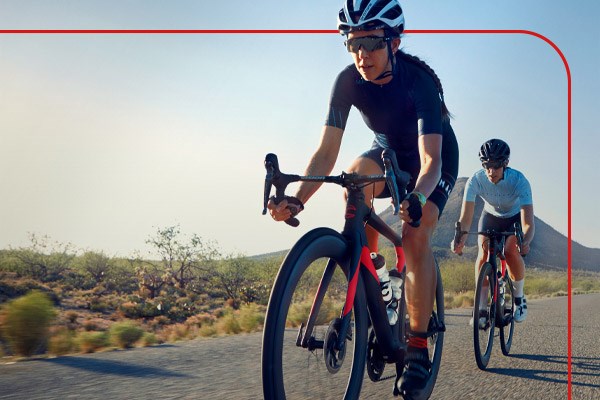Not lubing your bike can cause various problems such as increased wear and tear, rust, and poor performance. Regular lubrication is essential to maintain your bike’s functionality and longevity.
Neglecting this basic maintenance task can lead to costly repairs and reduce the lifespan of your bike. As a responsible bike owner, it is important to understand the importance of proper lubrication and make it a regular part of your bike maintenance routine.
In this article, we will delve into the details of what happens if you don’t lube your bike, how often you should do it, and the different types of lubricants available in the market.

Credit: www.tredz.co.uk
Importance Of Bike Lubrication
The Role Of Lubrication In Bike Maintenance
Bike maintenance can be a daunting task, but one aspect that should never be neglected is lubrication. Lubrication plays a crucial role in maintaining the functionality, longevity, and overall performance of a bike. When applied correctly, it reduces friction, preventing wear and tear on important parts of the bike.
Here are some key points to keep in mind:
- Lubrication creates a barrier between metal parts, reducing friction and wear.
- It helps to protect against rust, corrosion, and dirt buildup.
- Proper lubrication helps to keep the bike running smoothly and quietly.
- Regular lubrication extends the life of your bike.
Effects Of Poor Bike Lubrication
Neglecting bike lubrication can lead to a variety of issues that can ultimately cause significant damage to the bike. Without proper lubrication, metal parts rub together, leading to friction and excess wear. Here are some common consequences of poor bike lubrication:
- Excess noise from the bike
- Difficulty shifting gears
- Slowed acceleration
- Increased resistance while pedaling
- Damage to valuable bike parts, including gears and chains, leading to costly repairs.
Why Bike Lubrication Is Critical For A Smooth Ride
Lubrication serves as a form of protection against wear and tear, but it also helps to keep the bike running smoothly and efficiently. Without proper lubrication, the pedals, gears, and chains create resistance, making riding more challenging and less comfortable.
Here’s why bike lubrication is critical for a smooth ride:
- Reduces friction, making the ride smoother.
- Protects against rust and corrosion that can lead to a rough ride.
- Regular lubrication extends the life of the bike, ensuring many more smooth rides.
How Bike Lubrication Prevents Premature Wear And Damage
Lubrication is an essential part of bike maintenance, and it plays a critical role in preventing premature wear and damage to the bike’s components. Without proper lubrication, the metal parts grind together, leading to friction that can cause damage. Here are some ways bike lubrication prevents premature wear and damage:
- Lubrication protects against dirt and debris buildup which can cause damage to the bike’s components.
- Proper lubrication helps the bike run more smoothly, reducing the amount of friction and damage caused by metal parts rubbing together.
- The protective layer that lubrication creates helps to reduce wear and tear on critical bike components, including gears, chains, and pedals.
Signs Of Poor Bike Lubrication
Biking is a fun activity, but it requires a lot of care, especially when it comes to bike lubrication. If you neglect this aspect of bike maintenance, you can compromise the longevity and performance of your bike. In this section, we will explore the signs that indicate poor bike lubrication that you should be aware of.
Strange Or Unusual Bike Noises
If you hear strange and unusual noises when you ride your bike, it is usually a sign that your bike is not appropriately lubricated. This happens when metal rubs against metal, causing friction. If the noise persists, it could lead to more significant problems that will require costly repairs.
- Bike lubrication helps reduce noise and keeps your bike running smoothly.
- If you hear unusual noises while biking, examine the bike chain, pedals, and derailleur for dirt or debris.
Difficulty Shifting Gears
If you are experiencing difficulty shifting gears, your bike might not be sufficiently lubricated. Shifting gears require the smooth movement of the bike’s mechanism, which can be disrupted if there is a lack of proper lubrication.
- Check your bike’s chain, derailleur, and cables for any dirt or debris that could affect the bike’s shifting mechanism.
- Proper lubrication will ensure that the gears shift smoothly and efficiently, enhancing your biking experience.
Grinding Sound Coming From The Bike
A grinding sound coming from your bike is another sign that your bike needs lubrication. Grinding metal on metal is a clear indication that your bike is not sufficiently lubricated, and this could lead to significant bike damage.
- Regular oiling and greasing of bike parts will keep the metal parts from grinding on each other.
- If you notice any grinding sounds while biking, check the bike chain, pedals, and derailleur for dirt or debris.
Accumulation Of Dirt And Dust On Bike Parts
Dirt and dust accumulation on bike parts can be a cause of poor bike lubrication. Accumulated dirt and dust can lead to rusting and corrosion, which can reduce the lifespan of the bike.
- Regular cleaning, degreasing, and oiling of bike parts will prevent dirt and dust accumulation on bike parts.
- Using appropriate bike cleaners, brushes, and lubricants will help you clean your bike thoroughly and get rid of any dirt or dust that has accumulated on bike parts.
Rust On Bike Metal Parts
Rust on bike metal parts is a clear indication of poor bike lubrication. If you notice rust on your bike’s metal parts, it could be because they were not appropriately lubricated, leading to deterioration.
- Regular oiling and greasing of bike metal parts will prevent the accumulation of rust.
- Proper lubrication will help protect the metal parts of your bike from the elements and prevent rust buildup.
Don’t wait for your bike to start showing these signs of poor lubrication, make sure to regularly oil and grease your bike to enhance its performance and longevity.
Frequently Asked Questions On What Happens If I Don’T Lube My Bike
Why Do I Need To Lubricate My Bike?
Lubrication protects parts from wear and tear, reduces friction, and prevents rust.
How Often Should I Lube My Bike?
Lube your bike after every ride in wet or muddy conditions, and every few hundred miles in dry conditions.
What Type Of Lubricant Should I Use?
Choose a bike-specific lubricant based on your terrain, riding conditions, and the type of bike you have.
Can I Use Any Lubricant I Have On Hand?
It’s best to use a bike-specific lubricant rather than household items that could damage your bike components.
Conclusion
As a bike owner, taking good care of your bike is crucial for performance and longevity. One of the ways to ensure your bike functions optimally is by lubricating it regularly. Failing to do so results in multiple negative impacts, such as increased wear and tear, rust buildup, and decreased efficiency.
Ignoring this vital maintenance task can be detrimental not just to your bike, but also to your safety on the road. Therefore, it’s important to prioritize keeping your bike well-lubricated with high-quality products. Remember, a well-maintained bike ensures that you enjoy a smoother ride, saves you money in the long run, and helps you avoid costly repairs.
So, make it a habit to keep your bike well-lubricated, and you’ll surely reap the benefits for years to come.
